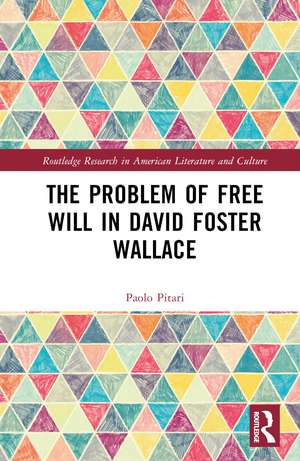The Problem of Free Will in David Foster Wallace: Routledge Research in American Literature and Culture
Autor Paolo Pitarien Limba Engleză Hardback – 27 iun 2024
To substantiate this thesis, the analysis reads Wallace in conversation with the existentialist philosophers and writers who influenced him: Søren Kierkegaard, Fyodor Dostoevsky, Martin Heidegger, Jean-Paul Sartre, Albert Camus, and Ludwig Wittgenstein. It compares his non-fiction with the sociologies of Christopher Lasch, Zygmunt Bauman, Ulrich Beck and Elisabeth Beck-Gernsheim, and Anthony Giddens. And it finds inspiration in Giacomo Leopardi, Friedrich Nietzsche, and Emanuele Severino to conclude that the philosophy which pervades Wallace’s works entails despair and represents the essence of our civilization’s interpretation of the world.
Din seria Routledge Research in American Literature and Culture
- 9%
 Preț: 934.94 lei
Preț: 934.94 lei -
 Preț: 309.27 lei
Preț: 309.27 lei -
 Preț: 311.41 lei
Preț: 311.41 lei -
 Preț: 279.69 lei
Preț: 279.69 lei -
 Preț: 389.66 lei
Preț: 389.66 lei - 5%
 Preț: 1158.69 lei
Preț: 1158.69 lei -
 Preț: 389.66 lei
Preț: 389.66 lei - 18%
 Preț: 1113.32 lei
Preț: 1113.32 lei -
 Preț: 386.61 lei
Preț: 386.61 lei -
 Preț: 381.21 lei
Preț: 381.21 lei -
 Preț: 370.39 lei
Preț: 370.39 lei - 18%
 Preț: 1000.27 lei
Preț: 1000.27 lei - 18%
 Preț: 1110.43 lei
Preț: 1110.43 lei -
 Preț: 382.18 lei
Preț: 382.18 lei -
 Preț: 389.66 lei
Preț: 389.66 lei - 18%
 Preț: 836.89 lei
Preț: 836.89 lei - 18%
 Preț: 1060.08 lei
Preț: 1060.08 lei -
 Preț: 385.04 lei
Preț: 385.04 lei -
 Preț: 381.98 lei
Preț: 381.98 lei -
 Preț: 385.71 lei
Preț: 385.71 lei - 18%
 Preț: 1054.71 lei
Preț: 1054.71 lei -
 Preț: 384.09 lei
Preț: 384.09 lei -
 Preț: 379.48 lei
Preț: 379.48 lei -
 Preț: 379.30 lei
Preț: 379.30 lei - 26%
 Preț: 847.73 lei
Preț: 847.73 lei - 18%
 Preț: 1000.27 lei
Preț: 1000.27 lei - 18%
 Preț: 1000.27 lei
Preț: 1000.27 lei -
 Preț: 383.30 lei
Preț: 383.30 lei - 17%
 Preț: 259.98 lei
Preț: 259.98 lei -
 Preț: 385.41 lei
Preț: 385.41 lei -
 Preț: 383.50 lei
Preț: 383.50 lei
Preț: 1054.71 lei
Preț vechi: 1286.24 lei
-18% Nou
Puncte Express: 1582
Preț estimativ în valută:
201.82€ • 211.25$ • 167.98£
201.82€ • 211.25$ • 167.98£
Carte tipărită la comandă
Livrare economică 31 martie-14 aprilie
Preluare comenzi: 021 569.72.76
Specificații
ISBN-13: 9781032676678
ISBN-10: 1032676671
Pagini: 286
Dimensiuni: 152 x 229 mm
Greutate: 0.45 kg
Ediția:1
Editura: Taylor & Francis
Colecția Routledge
Seria Routledge Research in American Literature and Culture
Locul publicării:Oxford, United Kingdom
ISBN-10: 1032676671
Pagini: 286
Dimensiuni: 152 x 229 mm
Greutate: 0.45 kg
Ediția:1
Editura: Taylor & Francis
Colecția Routledge
Seria Routledge Research in American Literature and Culture
Locul publicării:Oxford, United Kingdom
Public țintă
PostgraduateCuprins
Preface: The problem of free will
Introduction: The problem of free will in David Foster Wallace
Part one: Literary truth according to David Foster Wallace
Chapter 1: The influence of Leo Tolstoy’s What Is Art? on David Foster Wallace’s literary project
Chapter 2: The influence of Jean-Paul Sartre’s “What Is Literature?” on David Foster Wallace’s literary project
Part two: The problem of free will in David Foster Wallace’s literary sociology
Chapter 3: The system of David Foster Wallace’s literary sociology
Chapter 4: On narcissism: David Foster Wallace and Christopher Lasch
Chapter 5: On morality and the absurd: David Foster Wallace and Zygmunt Bauman
Chapter 6: On existentialism and capitalism: David Foster Wallace and Ulrich and Elisabeth Beck
Chapter 7: On ontological insecurity: David Foster Wallace and Anthony Giddens
Part three: The problem of free will in David Foster Wallace’s fiction: A comparative reading of Fyodor Dostoevsky and David Foster Wallace
Chapter 8: A critical history of the philosophical criticism on Fyodor Dostoevsky and David Foster Wallace
Chapter 9: Fyodor Dostoevsky, Mikhail Bakhtin, and David Foster Wallace: United in existentialism
Chapter 10: The problem of free will in Crime and Punishment and The Pale King
Bibliography
Index
Introduction: The problem of free will in David Foster Wallace
Part one: Literary truth according to David Foster Wallace
Chapter 1: The influence of Leo Tolstoy’s What Is Art? on David Foster Wallace’s literary project
Chapter 2: The influence of Jean-Paul Sartre’s “What Is Literature?” on David Foster Wallace’s literary project
Part two: The problem of free will in David Foster Wallace’s literary sociology
Chapter 3: The system of David Foster Wallace’s literary sociology
Chapter 4: On narcissism: David Foster Wallace and Christopher Lasch
Chapter 5: On morality and the absurd: David Foster Wallace and Zygmunt Bauman
Chapter 6: On existentialism and capitalism: David Foster Wallace and Ulrich and Elisabeth Beck
Chapter 7: On ontological insecurity: David Foster Wallace and Anthony Giddens
Part three: The problem of free will in David Foster Wallace’s fiction: A comparative reading of Fyodor Dostoevsky and David Foster Wallace
Chapter 8: A critical history of the philosophical criticism on Fyodor Dostoevsky and David Foster Wallace
Chapter 9: Fyodor Dostoevsky, Mikhail Bakhtin, and David Foster Wallace: United in existentialism
Chapter 10: The problem of free will in Crime and Punishment and The Pale King
Bibliography
Index
Notă biografică
Paolo Pitari completed a joint PhD in English at the Ca’ Foscari University of Venice and at LMU Munich. He is the author of numerous academic articles in literature and philosophy. This research was funded by the University of Venice, the JFK Institute of Freie Universität Berlin, and the DAAD.
Descriere
This book argues that David Foster Wallace failed to provide a response to the existential predicament of our time. Wallace wanted to confront despair through art, but he remained trapped, and his entrapment originates in the ‘existentialist contradiction
